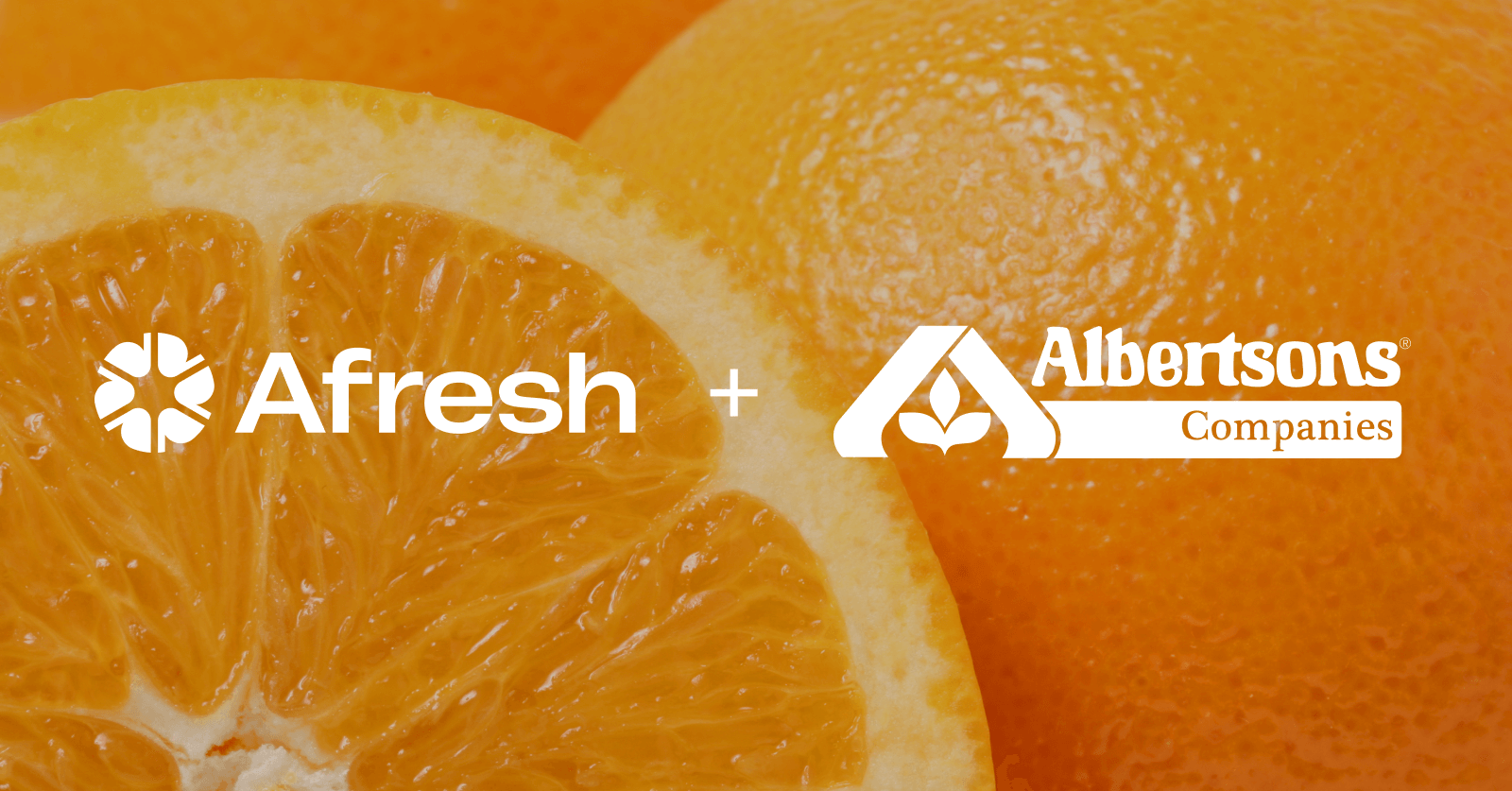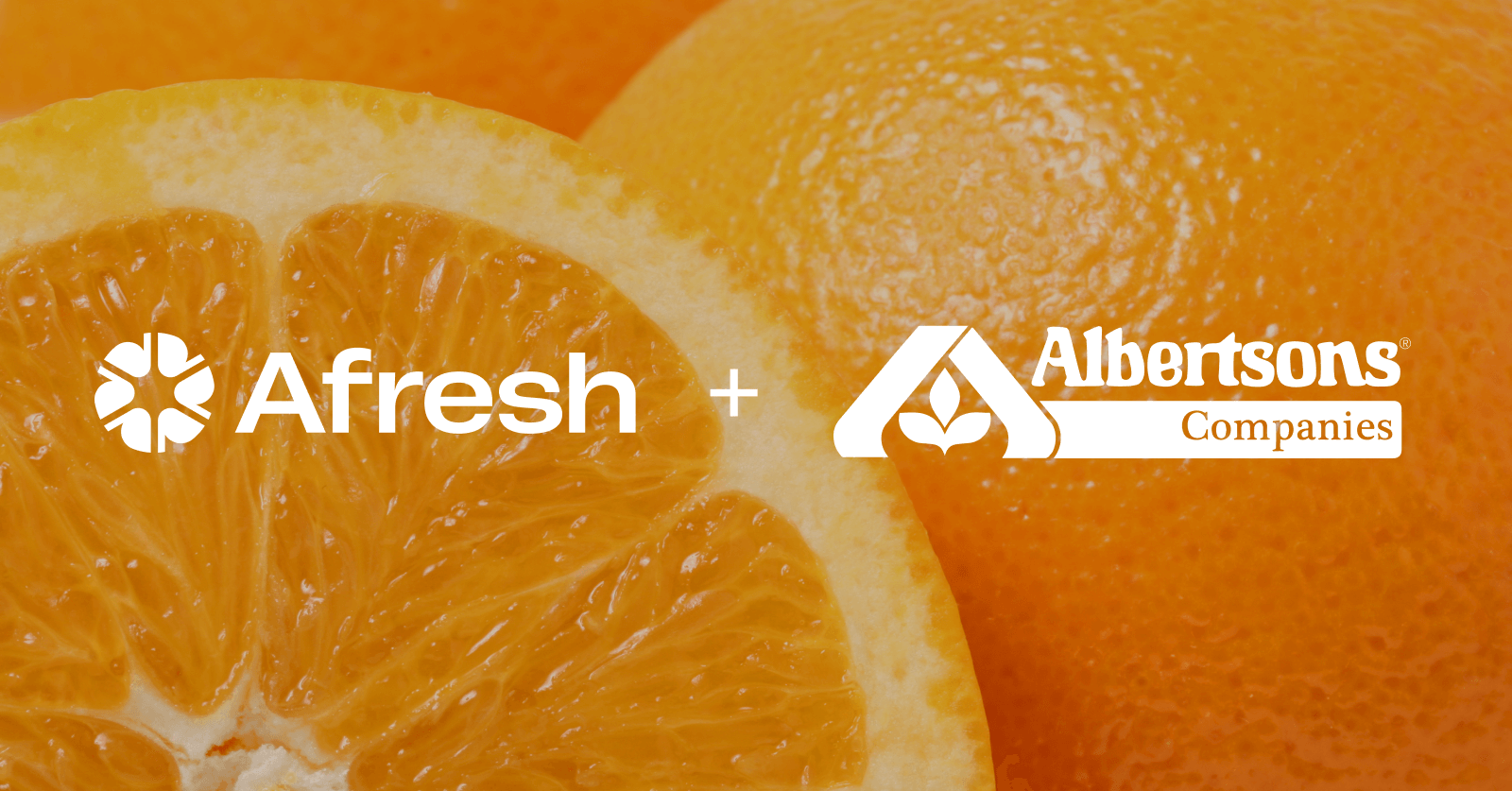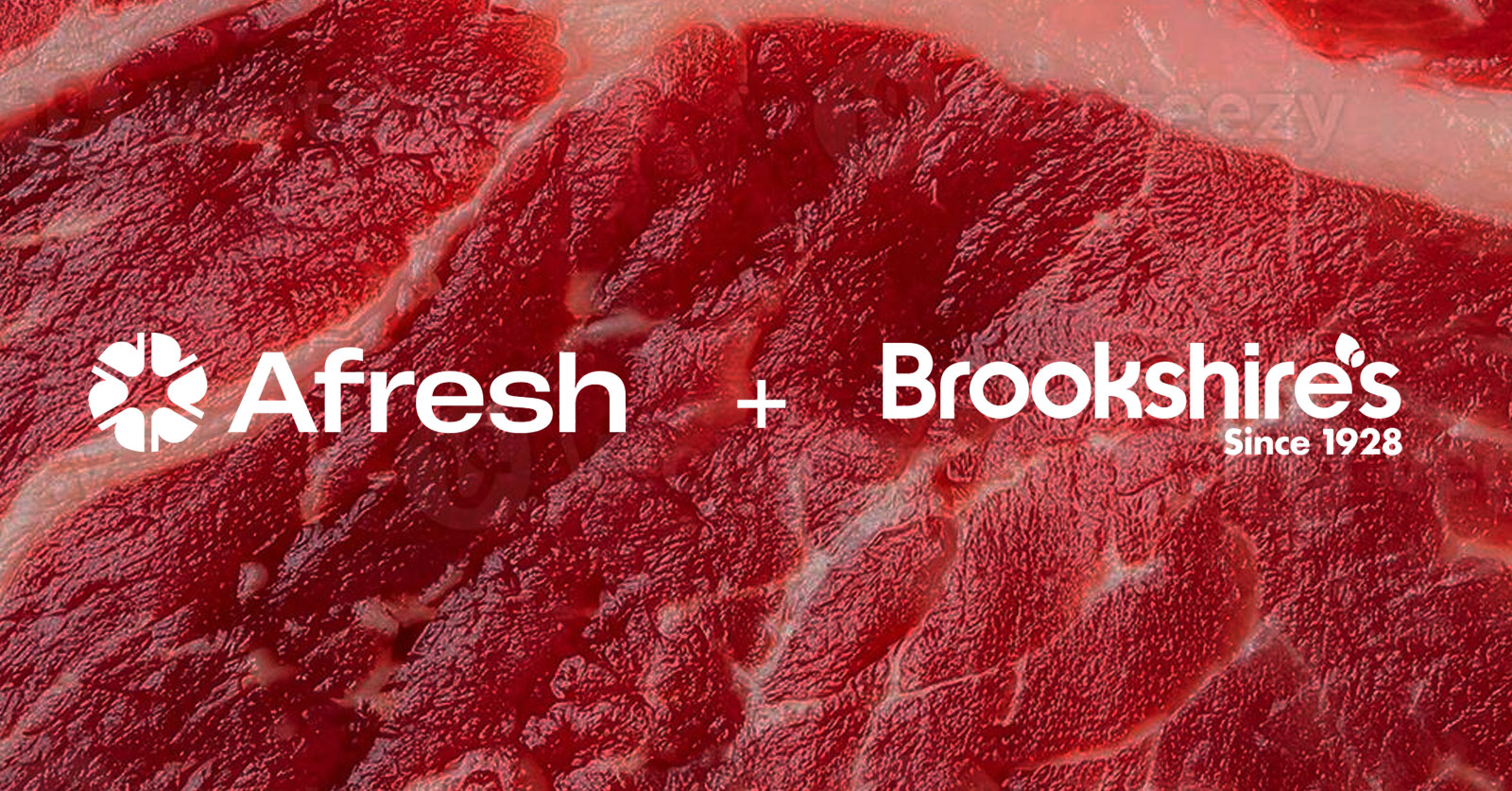- Press
- •Article
Afresh Launches Industry’s First AI-Powered Fresh Buying Solution with Wakefern
Wakefern, the nation’s largest retailer-owned cooperative, will be among the first to deploy Afresh’s breakthrough Fresh Buying solution — the world's first technology designed to help fresh buyers take control of their entire day, replacing fragmented systems with one streamlined intelligent solution built for the pace of Fresh and the best in customer experience.


- Press
- •Article
Afresh Launches Its Biggest-Ever Product Release, Including the Launch of Its Fresh Store Suite and Expansion to a Comprehensive Fresh Platform
Afresh Launches Its Biggest-Ever Product Release, Including the Launch of Its Fresh Store Suite and Expansion to a Comprehensive Fresh Platform

- Press
- •Article
Afresh Recognized as Next Generation Supply Chain Innovator by SVG Ventures-THRIVE
Afresh has been named a leader on the THRIVE Top 50 FoodTech Companies list for the second consecutive year. This annual ranking by SVG Ventures-THRIVE celebrates leading FoodTech companies and recognizes Afresh's innovation in the Next Generation Supply Chain category for its groundbreaking approach to modernizing the fresh food supply chain. Utilizing the world's first AI engine built for fresh grocery, Afresh enables accurate replenishment and inventory management across the supply chain, guaranteeing shoppers access to peak freshness while reducing grocers' waste.

- Press
- •Article
Stater Bros. Implements a Chain-Wide Rollout of Afresh in Produce Departments to Improve Profitability, Ordering and Inventory Capabilities, and Reduce Food Waste
Afresh, the world's first AI engine designed for the unique challenges of fresh grocery, is announcing that Stater Bros. is rolling out its store ordering solution chainwide across its Produce departments. After a successful pilot, the Southern California-based chain is implementing Afresh in all of its 169 stores. Stater Bros. is well-known among shoppers for its fresh and affordable foods. By using Afresh, it will now be easier for Stater Bros. to deliver on those promises.

- Press
- •Article
Fresh Thyme Expands to Afresh Store Ordering for Food Service, the AI-Powered System to Optimize Ordering and Inventory Management for Deli and Prepared Foods Departments
Afresh, the world's first AI engine designed for the unique challenges of fresh grocery, announced today that Fresh Thyme Market is rolling out Afresh Store Ordering for Food Service. With this addition, Afresh gives Fresh Thyme the ability to tap into AI that is specifically built for the nuances of fresh foods to deliver high quality ordering and inventory management for deli and prepared foods. Fresh Thyme is now on track to use Afresh to order across its core fresh departments – including Produce, Meat, Seafood as well as Food Service – for its entire chain of 70 stores by end of year.

- Press
- •Article
Afresh Enhances Supply Chain Capabilities with the Launch of Afresh DC Forecasts, Partnering with Albertsons Companies as the First Customer
Afresh Technologies, the world's leading fresh food technology company, is announcing the launch of its first solution for distribution centers, Afresh DC Forecasts. The new AI-powered DC Forecasts offer the first-ever fresh-specific technology solution for DC buyers that automatically compiles the data the buyers must consider every day to forecast upcoming orders from the stores they serve.

- Customer Stories
- •Case Study
Afresh and Alvarez & Marsal CRG Partner to Save U.S. Value Grocer Gain an Estimated $2.7M Annually
A U.S. value grocer sought to provide its customers – especially those in areas with limited access to nutritious food – with affordable, fresh produce at a competitive price. Yet high shink, staff turnover, and low inventory turns highlighted issues with their centralized distribution model and prevented stores from achieving the degree of operational efficiency required to keep produce at optimal freshness and pass savings along to customers.

- Solution
- •Article
The Future of Fresh Inventory: How Afresh's Machine Learning Model is Reimagining Inventory Management
Afresh’s inventory estimator (InvHMM) marries the predictive power of machine learning with the flexibility of hidden Markov models to offer grocery retailers a robust solution that not only enhances inventory accuracy but also optimizes ordering and mitigates shrink.
.jpg)
- Solution
- •Article
The Game-Changing Advantages of AI in Grocery
Afresh is setting a new standard for operational excellence in fresh. Our AI equips grocery retailers with the tools to reduce shrink, ensure optimal stock levels, and facilitate smarter, data-driven ordering. In this way, our leading-edge AI not only elevates operational efficiency but also enhances customer satisfaction by fueling an exceptional in-store experience.
.jpeg)
- Industry Insights
- •Article
The Pivotal Role of Ordering in Optimizing Meat Departments
As the most influential department on the store's perimeter, meat drives significant foot traffic and sales for grocery retailers. The meat department also presents a unique opportunity for grocers to differentiate themselves from competitors. Recognizing this, industry leaders like Albertsons are increasingly looking towards Afresh’s innovative solutions to better serve their communities.

- Press
- •Article
Afresh Deploys AI-Powered Store Ordering and Inventory Platform to Albertsons Companies' Meat and Seafood Departments Chainwide
fresh Technologies, the world's leading fresh food technology company, and Albertsons Companies (NYSE: ACI) announced today the enterprise rollout of the Afresh platform into the meat and seafood departments in more than 2,200 Albertsons Cos. banner stores including Safeway, Albertsons, Jewel-Osco, Shaw's, Vons and ACME.

- Industry Insights
- •Article
Empowering Store Teams and Reducing Shrink with AI
As grocery tech executives navigate the paradigm shift AI has introduced to this industry, it's crucial to recognize where AI can drive transformational impact. While some may see AI as a means to cut labor costs, Afresh prioritizes the empowerment – not replacement – of store associates. The best way to do this is by leveraging intelligent inventory management solutions to reduce shrink.

- Press
- •Article
Afresh Adds Inventory Management Solution to AI-Powered Fresh Tech Platform
Afresh inventory management minimizes the time and cost of taking ending inventory, delivering reliable and accurate financials while pairing seamlessly with Afresh store ordering to save teams time and drive higher profits across grocers' fresh business

- Industry Insights
- •Impact Report
The Future of Fresh
Over the past year, retailers have navigated changing workforce dynamics, customer demand for seamless omnichannel experiences, and fluctuating economic conditions. To stay ahead of the competition, leading grocers are setting fresh-focused strategic priorities designed to enhance customer experiences and expand profits. In The Future of Fresh, we explore the foundational changes taking place in grocery retail as businesses prepare for what's next in fresh.
.png)
- Customer Stories
- •Case Study
How Albertsons delivers the fresh experiences customers crave
Albertsons Companies is a world-class grocery retailer that aims to provide every customer with the best experience possible, and shoppers consistently turn to their local banner to find the best fresh food. Today, retail associates across the chain optimize fresh operations and deliver even better experiences using AI-powered technology from Afresh.

- Customer Stories
- •Case Study
How IT leaders can champion better experiences in fresh
Every grocer’s IT department plays a significant role in driving operational efficiency and companywide innovation. Leaders like Maria Latushkin, GVP of Technology at Engineering at Albertsons Companies, now have the opportunity to champion innovative new strategies that leverage technology to improve outcomes.

- Industry Insights
- •Article
Grocery transformation in 2023: how IT is driving true, bottom-line change
The phrase "do more with less" has never been more true, especially in grocery retail IT. And yet, some IT executives are finding ways to lead transformational change for their brands, while still balancing resource allocation and prioritization amid unprecedented market constraints.

- Industry Insights
- •Article
Grocer’s Guide to RFPs for Fresh
Fresh is the most important part of any grocery retailer’s digital strategy and identifying the best-in-class technology for fresh operations is critical. Explore this page to find out why grocers are taking a purpose-built approach to technology and download your free Fresh RFP template to get started on your search!

- Industry Insights
- •Article
A new approach that delivers in fresh
In order to be effective in fresh, a system must assess the available data with the expectation of imperfection (which is inherent to fresh goods) and apply techniques jointly across inventory estimation, demand forecasts, and order recommendations to understand and adjust for the degree of uncertainty within the data.
.jpg)
- Company
- •Article
Accelerated time to value and low IT lift: the new standard for deploying fresh technology
The grocery industry is experiencing new opportunities for growth with purpose-built tools for modernizing their supply chains. As members of a highly competitive market, this is a critical opportunity to realize higher profits, faster inventory turns, and fresher food for customers.

- Company
- •Article
Why IT leaders are embracing best-in-class solutions for fresh
When choosing their supply chain and inventory management software solutions, should grocers adopt an all-in-one or a best-in-class approach? We believe — admittedly with just a little bias — that the ROI, the strategic enablement, and the surprisingly simple maintenance of our best-in-class, purpose-built tool make this an easy decision.
.png)
- Sustainability
- •Case Study
Using Artificial Intelligence to Reduce Food Waste in Grocery Retail
Two large retailers used artificial intelligence (AI) solutions to improve their order accuracy, which led to a 14.8% average reduction in food waste per store. While the two pilots were conducted at large retailers, the AI solutions also work for smaller chains. If the entire grocery sector were to implement these solutions, an estimated 907,372 tons of food waste could be prevented, representing 13.3 million metric tons of avoided CO2e emissions and more than $2 billion in financial benefits for the sector.

- Customer Stories
- •Case Study
Improving Product Freshness with Faster Inventory Turns at CUB
During the 3-month pilot period, Afresh helped produce teams optimize ordering and inventory management. As a result, sales increased by +2.5%, inventory holds decreased by +7.4%, and inventory turns improved by +6.7%.

- Sustainability
- •eBook
Food Waste: A Solvable Problem
Every year, $1 trillion of food gets thrown away, and the cost is much higher in the long run. Read our free ebook to answer questions like: What is food waste; how do we fix the food waste problem; and what can we all do to help keep food out of landfills.
.jpeg)
- Company
- •Article
Celebrating Stop Food Waste Day with Solutions Across the Supply Chain
Food waste is a solvable problem, but it will take a village to get there. To shine a light on the important solutions already at work to eliminate food waste, Afresh hosted a webinar with Imperfect Foods, Apeel, and Too Good to Go.

- Industry Insights
- •Video
Attracting and Retaining Talent in Fresh Departments
Fresh departments are the most important—and most difficult—to manage and that means stores need top employees that stick around + better training tools for new team members. Fresh-first technology is the right tool for the right job. It helps employees be more effective, drives adherence and retention, and improves employee happiness.

- Company
- •Article
Celebrating Our Birthday: 5 Things We’ve Learned in 5 Years at Afresh
Afresh was founded in 2017 with the mission of eliminating food waste and making fresh food accessible to all. Since then, we’ve learned so much! Here’s a taste of what we’ve uncovered after five years focused on fresh.

- Industry Insights
- •Article
From Dreadful to Delightful: Making Order Writing Fun in Fresh
For decades, fresh department employees have dreaded the time-consuming task of placing an order. Although the process has evolved some, store teams want tools that empower their decision-making instead of leaving them behind in the digital dust.

- Company
- •Article
Diversity, Equity, Inclusion, and Belonging at Afresh
Afresh's commitment to our communities extends beyond our products and technologies. We’re creating a workplace that embraces diversity, equity, inclusion, and belonging (DEIB), and where everyone can make an impact while being celebrated for their fully authentic selves.

- Industry Insights
- •Article
The Berry Breakdown: Why the Most Expensive Categories Require Accurate Ordering
Strawberries are the most popular fruit in the U.S., with blueberries coming in second. By now, consumers expect fresh berries to be in stock all year long. And for fresh department teams, that can be a challenge. We pulled in industry expert Scott Schuette to share his best practices for dealing with the winter berry blues!

- Company
- •Article
2021 By the Numbers
Afresh has grown by leaps and bounds in 2021, from opening a new office in downtown San Francisco to welcoming more than 80 new team members. As we wind down the year, we’re celebrating some massive milestones, with many more to come in 2022. It’s an exciting time to join us at Afresh!

- Sustainability
- •Article
Afresh’s Work to Eliminate Food Waste
At Afresh, our mission to eliminate food waste and make fresh food accessible to all underlies every part of our work. By empowering produce managers to place perfect orders with our AI-powered recommendations, Afresh reduces shrink by an average of 25% and adds 2 days to post-sale shelf life.

- Industry Insights
- •Article
How to Prepare Fresh Departments for Winter Holidays
Key events like Thanksgiving, Christmas, and New Year’s create opportunities and challenges for fresh department inventory and product movement. To keep stockouts and shrink low, use these best practices to stay ahead of the rush this holiday season.

- Industry Insights
- •Infographic
Moving Forward in Fresh: 2021 and Beyond
2020 and 2021 required both customers and grocery store chains to adapt to constant changes. But it adjusted expectations, too. Customers eat more at home, want more fresh food, and shop differently - here's what to expect in 2021 and beyond.

- Industry Insights
- •Video
How AI Will Improve Perimeter Profits and Reduce Food Waste
Matt Schwartz and Scott Schuette sit with Mike Troy of Progressive Grocer to discuss how Afresh's Fresh Operating System helped Fresh Thyme write more effective orders and stay in stock during unexpected snowstorms and COVID-19.

- Solution
- •Podcast
How Fresh is Your Supply Chain?
That produce on the shelves isn't always the freshest stuff around. By the time most food reaches the grocery store, it might already be several weeks old. And just how much shelf life remains? It's anyone's guess. Afresh aims to make the food supply chain smarter, reduce food waste, and minimize stock-outs along the way.

- Solution
- •Podcast
The Feed by Hngry: Leveraging AI in Fresh Grocery
Hear a discussion about the legacy technology that grocers have relied upon for decades and the trickle-down effects when it comes to providing consumers with fresh, nutritious food that doesn’t go bad by the time it makes it to the fridge.

- Company
- •Article
How Fresh-first Tech Gives Customers Better Blueberries
Keeping fresh blueberries in stock isn’t as simple as it sounds. But when grocery stores are low, customers have no choice but to pick the freshest-looking container and hope for the best. This often leads to berries going bad before they can be eaten. There is a solution, and it’s better tech for fresh departments.

- Sustainability
- •Article
The Problem of Food Waste
“Finish your plate!” From the time we’re kids learning to use a fork, to when we’re young adults learning to make our own meals, we’re taught not to waste food. And why would we want to? Every black banana or bunch of greens that have wilted to mush is a visual representation wasted hard-earned time and money.

- Sustainability
- •Article
The Challenge of Fresh
Every day, people grow more conscious of the effects their consumer choices have on their personal and environmental health. We want to eat better and waste less; we want healthier, more affordable fresh food that nourishes our bodies and lasts long enough in our refrigerators to enjoy. We want the valuable time and money we spend in our grocery stores to yield the tastiest, most nutritious produce possible.

- Press
- •Article
Heinen's Partners with Afresh to Offer the Freshest, Highest Quality Foods to Its Communities
Afresh, the first artificial intelligence-powered fresh food optimization platform for grocers, and Heinen's, the preeminent neighborhood grocery store for the Cleveland and Northern Chicago areas, today announced a new partnership in which Heinen's will deploy the Afresh solution suite in fresh departments across the chain.
.png)




.jpeg)





.png)























